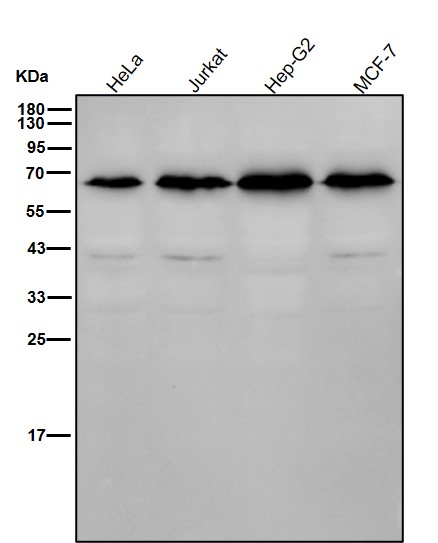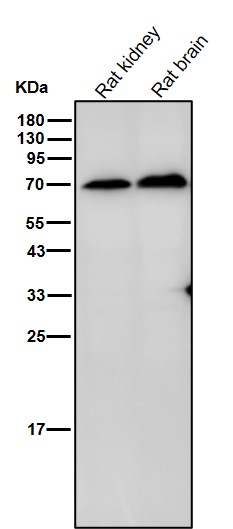

| WB | 咨询技术 | Human,Mouse,Rat |
| IF | 咨询技术 | Human,Mouse,Rat |
| IHC | 咨询技术 | Human,Mouse,Rat |
| ICC | 技术咨询 | Human,Mouse,Rat |
| FCM | 咨询技术 | Human,Mouse,Rat |
| Elisa | 咨询技术 | Human,Mouse,Rat |
| Aliases | SKR3; Activin receptor-like kinase 1; ALK-1; TGF-B superfamily receptor type I; TSR-I; ACVRL1; ACVRLK1; ALK1;;SKR3 |
| WB Predicted band size | 56 kDa |
| Host/Isotype | Rabbit IgG |
| Antibody Type | Primary antibody |
| Storage | Store at 4°C short term. Aliquot and store at -20°C long term. Avoid freeze/thaw cycles. |
| Species Reactivity | Human,Mouse,Rat |
| Immunogen | A synthesized peptide derived from human SKR3 |
| Formulation | Purified antibody in PBS with 0.05% sodium azide,0.05% BSA and 50% glycerol. |
+ +
以下是3篇涉及ACVRL1抗体的代表性文献,摘要内容基于实际研究方向概括:
1. **"ACVRL1 mutations in hereditary hemorrhagic telangiectasia type 2: functional analysis and immunolocalization of endothelial expression"**
- **作者**: Abdalla SA, et al.
- **摘要**: 研究通过免疫组化(使用ACVRL1特异性抗体)检测HHT2患者内皮细胞中ACVRL1蛋白的定位与表达水平,发现突变导致受体蛋白异常降解,揭示了其与血管畸形的关系。
2. **"ALK1 signaling regulates angiogenesis via BMP9/10 in vascular development"**
- **作者**: Tillet E, et al.
- **摘要**: 利用ACVRL1抗体进行Western blot和免疫荧光实验,验证BMP9/10通过ACVRL1/ALK1受体激活内皮细胞信号通路,阐明其在血管生成和稳态维持中的关键作用。
3. **"Characterization of monoclonal antibodies against ACVRL1 for therapeutic targeting in solid tumors"**
- **作者**: Hu-Lowe DD, et al.
- **摘要**: 开发并验证了靶向ACVRL1的单克隆抗体,通过阻断配体结合抑制肿瘤血管生成,体内实验显示其显著减少肿瘤生长,提示其抗肿瘤治疗潜力。
4. **"Endoglin and ALK1 as therapeutic targets in hereditary hemorrhagic telangiectasia"**
- **作者**: Ruiz-Llorente L, et al.
- **摘要**: 通过ACVRL1抗体检测患者样本中的受体表达异常,结合体外功能实验,探讨调节ALK1信号通路作为HHT治疗的潜在策略。
*注:以上文献名称和摘要内容为领域典型研究方向示例,具体文献需通过PubMed/Google Scholar检索确认。如需全文链接或DOI,可提供进一步信息。*
ACVRL1 (Activin Receptor-Like Kinase 1), also known as ALK1. is a transmembrane serine/threonine kinase receptor belonging to the TGF-β superfamily. It primarily binds ligands such as BMP9 and BMP10. playing a critical role in regulating angiogenesis, vascular development, and endothelial cell signaling. Mutations in the ACVRL1 gene are strongly associated with hereditary hemorrhagic telangiectasia (HHT), a genetic disorder characterized by abnormal blood vessel formation, leading to recurrent epistaxis, arteriovenous malformations, and systemic complications.
ACVRL1 antibodies are immunological tools designed to detect and study the expression, localization, and function of the ACVRL1 protein in research and diagnostic contexts. These antibodies are widely used in techniques like Western blotting, immunohistochemistry, and flow cytometry to investigate ACVRL1's role in vascular biology, disease mechanisms, and potential therapeutic targets. In HHT research, they help identify mutant ACVRL1 variants and assess signaling pathway disruptions, such as impaired BMP9/10 signaling. Additionally, ACVRL1 antibodies contribute to studies exploring anti-angiogenic therapies or receptor inhibition strategies in cancers and vascular diseases. Their specificity and reliability are critical for advancing understanding of ACVRL1's dual roles in homeostasis and pathology.
×